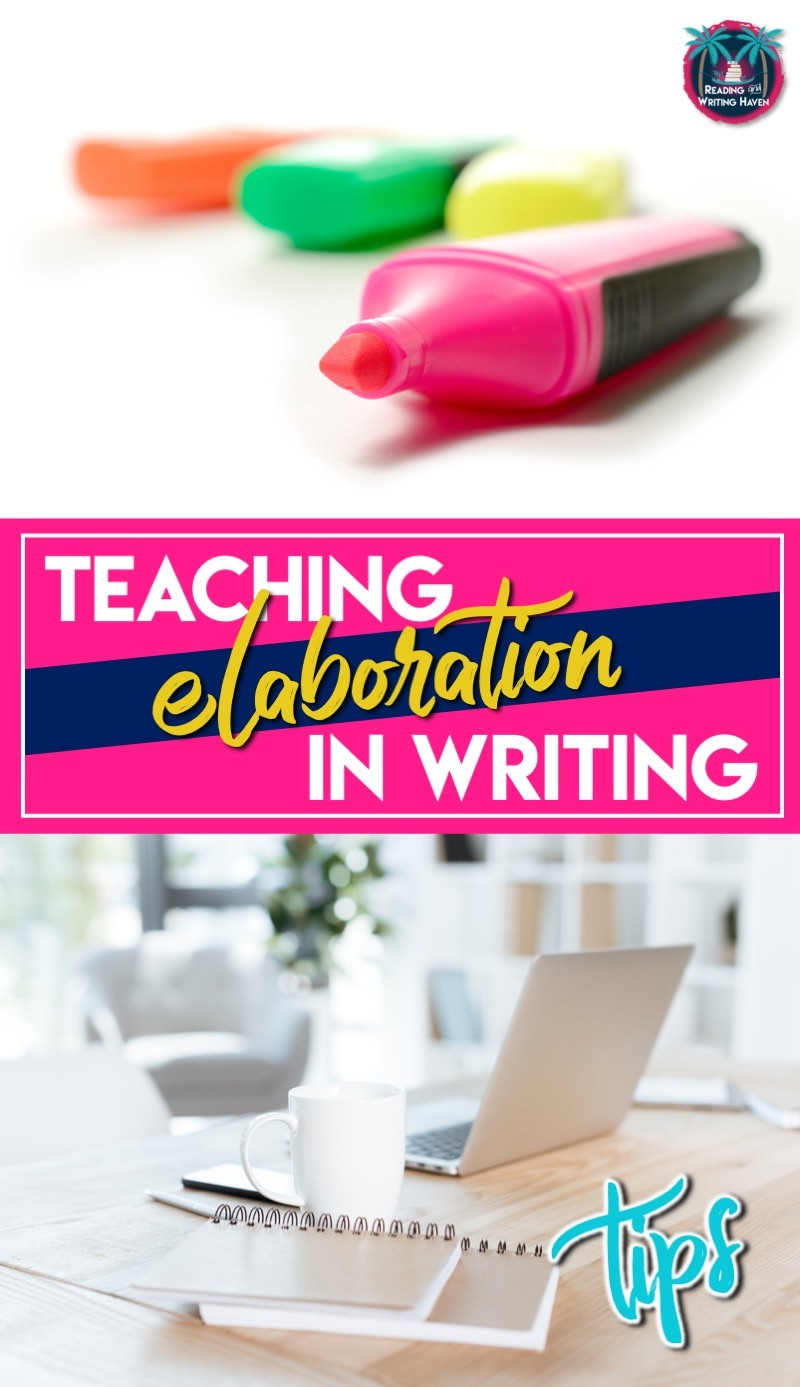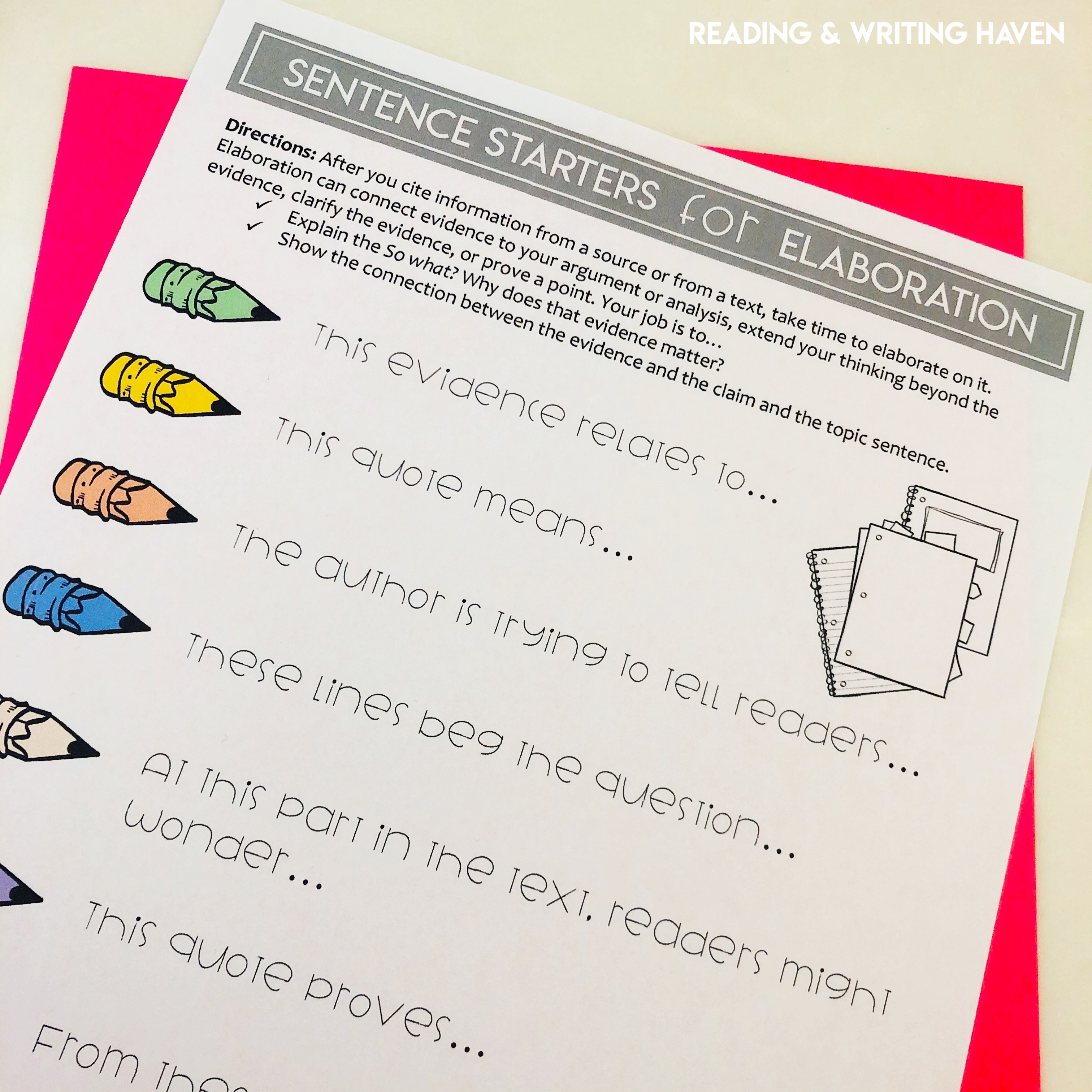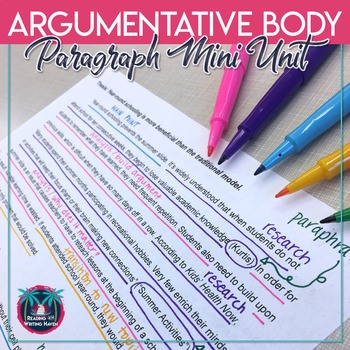Teaching Elaboration in Writing
Looking for ways to help students with elaboration in writing? It’s a complex skill that requires mature thinking. In this post, you’ll find concrete ways to make elaboration in writing more manageable for all students.
Imagine you are providing feedback on an essay that reads like this:
One of the ways the author creates a foreboding mood is through elaborate setting descriptions. For example, the author writes, “The earth which formed the floor was cold and hard. We were entering the last resting place of the dead of the Montresor family” (Poe 70). The mood is foreboding. The author uses words that create a foreboding mood.
A couple of observations about this example…
For one, the elaboration is clearly circular and lacking. However, the student was able to identify and correctly cite text evidence to support an analysis of the mood. If your students are not able to identify text evidence yet, it’s better to begin there than with support for elaboration. Let’s look at some ideas.
IDENTIFYING TEXT EVIDENCE
Play detective.
Have students search for evidence in a whole-class text to support a claim you give them. Then, sort the evidence students find into solid evidence or that which is a stretch. If students put their evidence onto a shared doc, the white board, or a sticky note, it is simple enough to rearrange in a t-chart format. Need more scaffolding? Provide the evidence, and have students sort it.
Annotate.
As a class, re-read the text, looking specifically for evidence that would support a claim. Have students annotate or highlight lines that would work to support the topic sentence and claim. Try working through this together as a class to begin. Then, ask them to do the same thing for a different chunk of the text in small groups. Finally, you can have them finish individually if you think they are ready.
Rank it.
Show students different examples of text evidence for an example claim and its topic sentence. Ask students to discuss how they would rank this evidence from strongest to weakest. Which lines best support the topic sentence? Which are the least convincing?
Once students can correctly identify some textual evidence to support their topic sentence, it’s time to focus on elaboration in writing.
ELABORATION IN WRITING
Confer.
One of the reasons I love slowing down my writing units is because it gives me time to confer. Instead of having students write their entire rough draft at once, go paragraph by paragraph, and as much as possible, give them feedback along the way.
This is what I ask students: “You argue that the author creates a foreboding mood through elaborate setting descriptions. Then, you write that one example of how the author does this is when they were entering the catacombs. Can you tell me why these lines make a foreboding feeling?” Almost every time, the student will either recognize that the text evidence does not support the topic sentence, OR the student will verbally explain to me exactly what they should have written in their paper.
Do this, not that.
Show students some parallel examples of elaboration. In one paragraph, show them what not to do. In the other, keep the solid elements from the first example but replace the elaboration with a good example. When we ground students’ understanding of elaboration in specific “dos” and “do nots,” it gives them a frame of reference to think back upon when writing their own examples.
Model.
Walk students through the process of elaborating by writing an example together as a class. Base your response upon a text the entire class has read or watched. Then, have students practice the skill under your supervision. Work with small groups to give them feedback before asking students to elaborate in writing independently.
Talk it out.
Students can often explain their evidence better when discussing it out loud than when writing. Break the writer’s block barrier by having students explain their evidence in a group or with you one-on-one.
Use prompts.
Teach students various methods for building upon their text evidence or research. Emphasize the So what? Why does it matter? This body paragraph resource contains tools for pushing thinking and teaching students to go beyond parroting what they have already said in different words.
Give them stems.
If your students really struggle with elaboration, consider providing them with some sentence stems to get started. A few examples include…
- This line proves…
- This scene illustrates…
- From this evidence, readers can infer…
- At this point, the author is trying to tell readers…
- This situation is similar to…
- In other words…
You can snag a free reference list of sentence starters for elaboration in writing from my resource library.
When it comes to teach elaboration in writing, I think we are missing a step. Instead of jumping straight from a mini lesson to independent practice, we can use scaffolds like the ones mentioned above to support skill development. After all, elaboration is not easy. It’s truly where thinking lives.
Hopefully these tips will help to build your students’ writing skills gradually. Selecting text evidence and elaborating on it can be frustrating for both teacher and student. Slowing down and providing meaningful feedback that focuses on revision is key. Make sure that students hear your feedback and, if they are willing, revise to learn from it.
READ NEXT:
Looking for more tips for teaching writing? These related articles might help.
ACRONYMS FOR ARGUMENTATIVE WRITING
SCAFFOLDING THE MULTIPLE-PARAGRAPH ESSAY
THE BIG LIST OF WAYS TO MOTIVATE STRUGGLING WRITERS
RELATED RESOURCE:
Use this scaffolded resource, specifically designed for argumentative research writing, to help students elaborate on text evidence or source material meaningfully. Find it here.



